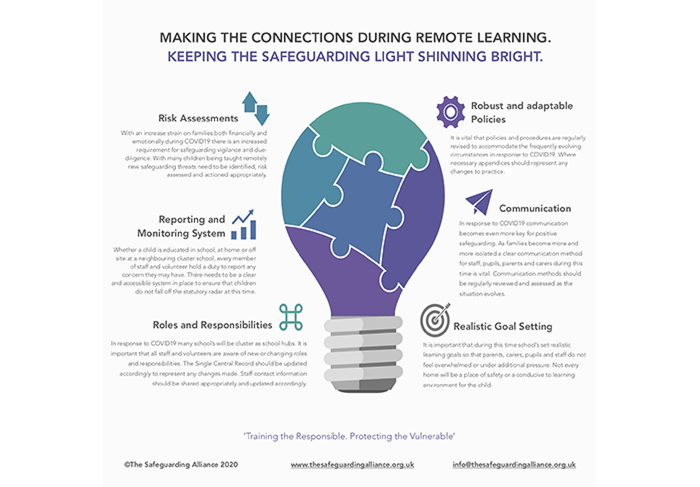Top 10 Tips for School Safeguarding for Remote Learnings
)
It is paramount that children are protected during this pandemic. Not everyone during this crisis will have good intentions and some will see this as an opportunity to exploit those most vulnerable. Equally, amidst the chaos of ensuring education is maintained, safeguarding best practice may be overlooked. The Safeguarding Alliance have created a checklist of considerations to ensure appropriate guidance, training and due–diligence.
1. Ensure Risk assessments are up-to-date and fit for purpose
With an increase strain on families both financially and emotionally during school closures there is an increased requirement for safeguarding vigilance and due diligence. With many children being taught remotely new safeguarding threats need to be identified, risk assessed and actioned appropriately.
2. Ensure there are robust and adaptable policies and procedures in place
It is vital that policies and procedures are regularly revised to accommodate the frequently evolving circumstances in response to the pandemic. Where necessary appendices should represent any changes to practice.
3. Ensure a clear communication is in place for both staff, parents and pupils
Communication becomes even more key for positive safeguarding. As families become more and more isolated a clear communication method for staff, pupils, parents and carers during this time is vital. Communication methods should be regularly reviewed and assessed as the situation evolves.
4. Ensure there is a robust reporting and monitoring system in place
Whether a child is educated in school, at home or off site at a neighbouring cluster school, every member of staff and volunteer hold a duty to report any concern they may have. There needs to be a clear and accessible system in place to ensure that children do not fall off the statutory radar at this time.
5 . Ensure that roles and responsibilities are defined to represent changes to practise
Many schools will be clustered as school hubs and it is important that all staff and volunteers are aware of new or changing roles and responsibilities. For UK schools the Single Central Record should be updated accordingly to represent any changes made. Staff contact information should be shared appropriately and updated accordingly.
6. Set realistic learning goals for pupils
It is important that during this time schools set realistic learning goals so that parents, carers, pupils and staff do not feel overwhelmed or under additional pressure. Not every home will be a place of safety or a conducive to learning environment for the child.
7. Ensure parent and pupil user agreements are in place and signed
It is important that there are appropriate parent, carer and pupil user agreements in place ensuring that every party understands what acceptable conduct during online and remote learning means. Clarity and expectations will allow for a safer learning space.
8. Ensure there is an online teaching protocol implemented and maintained
Schools should adopt a teaching online protocol agreement with staff. Doing this will allow staff clarity and guidance on what is expected and prohibited when teaching online. Providing guidance and a contract sets the benchmark best safeguarding practice in order to keep children safe.
9. Ensure there is an up-to-date information sharing policy
At a time where many schools across the country will be clustering it is important to ensure that there is an up-to-date information sharing policy in place. Key and critical safeguarding information will need to be communicated to hub schools in order to keep children safe.
10. Where possible teach through a remote learning platform and not a home server
Where possible as best practice schools should use a remote access for staff when offering online learning to pupils. If possible, pupils should also be given remote access use from their student accounts. This will limit and mitigate any online threat and will also allow the school the opportunity to monitor and be vigilant to peer-on-peer abuse.
 p
p
Emily Konstantas is CEO of the Safeguarding Alliance. She has a keen interest in all legislative frameworks surrounding child protection both in a National and International context. Emily sits on a number of advisory boards across Europe as a Safeguarding Expert and has founded and developed The Safeguarding Alliance, a London based Alliance which supports a global safeguarding network. Emily is keen to raise the profile of the rights of the child and looks at legislative barriers that need to be overcome in order to ensure continued best practice is established and maintained.


)
)
)
)
)
)
)
)
)